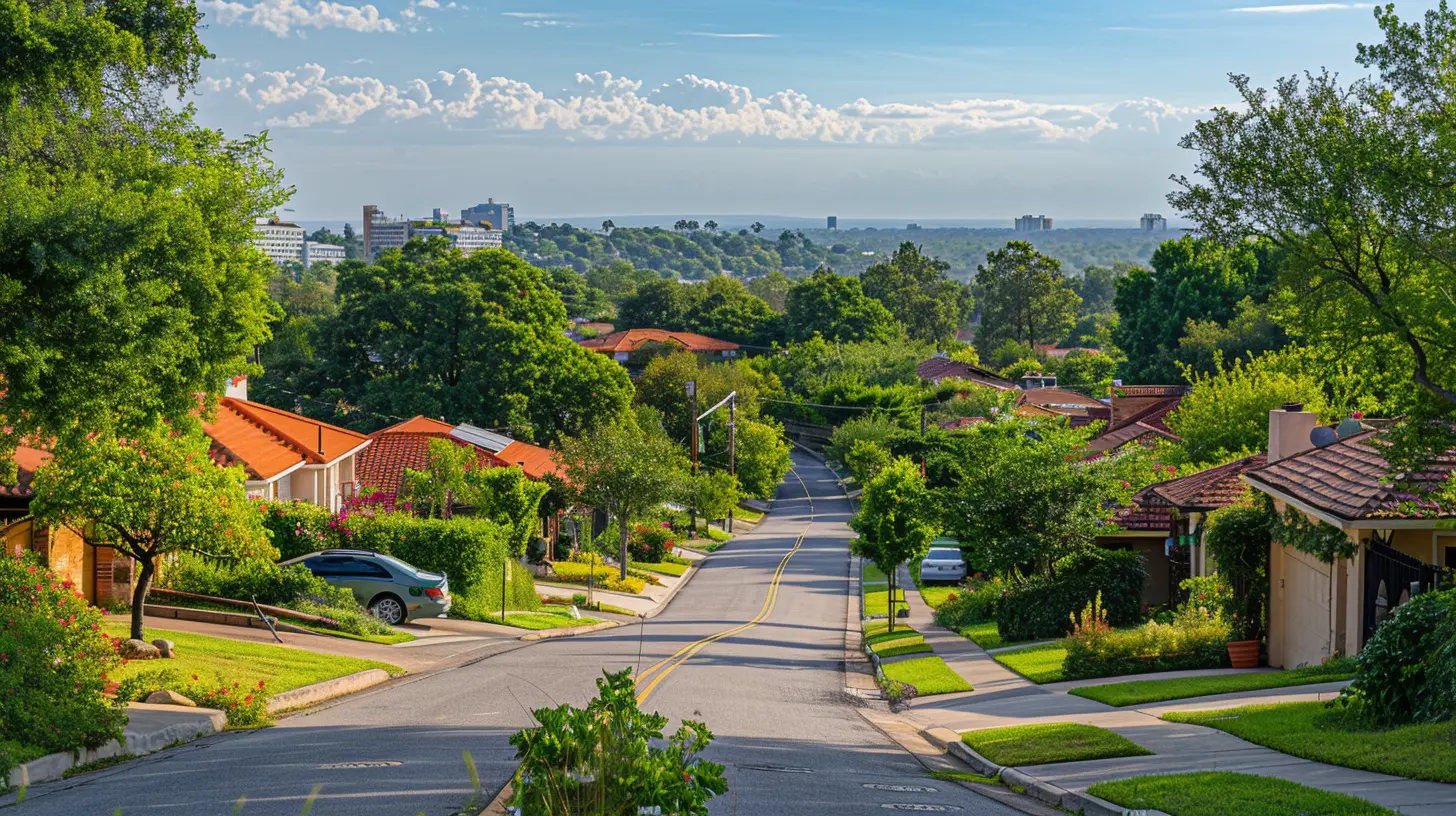Understanding Property Taxes as a First-Time Buyer
22 June 2025
Buying your first home is one of life’s biggest milestones—you’re finally planting roots and unlocking the American Dream. But let’s be real, there’s a lot more to homeownership than just choosing your dream kitchen or backyard oasis. One sneaky cost that catches many first-time buyers off guard? Property taxes.
Yep, those two little words can feel like a mystery to many new homeowners. But don’t worry—we’re about to break it all down, step by step, using plain language, zero jargon, and just enough humor to make this budget-busting topic kind of bearable.

So... What Exactly ARE Property Taxes?
Let’s start at the top: property taxes are local taxes levied by your city, county, or municipality based on the value of your home. These funds usually go toward public services like schools, roads, police departments, and fire stations. So in a way, when you pay property taxes, you're actually investing back into your community (and keeping those firetrucks running on time).But just because it’s for a good cause doesn’t mean it can’t be confusing.

Why Should First-Time Buyers Care About Property Taxes?
As a first-timer, you’ve probably crunched the numbers on your mortgage payment, maybe even factored in homeowners insurance. But if you skipped over property taxes while budgeting—uh-oh. These aren’t optional, and they can add hundreds (or thousands) to your monthly expenses.Imagine this: You find a mortgage payment you’re comfy with, only to realize later that your annual property taxes push you way over budget. Ouch. That’s why understanding how they work can save you a ton of stress—and money.

How Property Taxes Are Calculated
Here’s where things get a little nerdy, but stick with me! Property taxes are generally calculated like this:> Assessed Value of Your Property × Local Tax Rate = Property Tax Bill
Sounds simple, right? Well, kinda. Let’s break that into bite-sized pieces.
1. Assessed Value
This is the dollar value assigned to your property by the local tax assessor. It's not always the same as what you paid for the house. It could be higher or lower depending on when the last assessment was done, local market trends, or even renovations you’ve done.Think of it like this: The government sends someone over to peek at your house (not literally standing in your driveway, don't worry), they run some numbers, and then say, “We think this house is worth X.” That’s the assessed value.
2. Local Tax Rate (aka The Mill Rate)
This is where it varies big time depending on where you live. Your local government sets a percentage rate or “mill rate” (1 mill = $1 in tax for every $1,000 of assessed value). So if your assessed value is $250,000 and your local tax rate is 1.5%, you owe $3,750 in property taxes per year. (That’s about $312.50 a month.)
Where Do Property Taxes Go?
We mentioned earlier that property taxes fund public services, but let’s break it down a bit more—because it’s nice to know what you’re actually paying for.Here’s a look at what your tax dollars might help support:
- Public Schools – Even if you don’t have kids, a big chunk of your tax bill goes into local education.
- Emergency Services – Police, fire departments, and EMTs.
- Public Works – Road maintenance, trash pickup, water systems.
- Libraries and Parks – Community recreation and learning spaces.
- Local Government – Gotta keep the lights on at City Hall, too.
It’s like a membership fee for living in your neighborhood—but unfortunately, you don’t get to opt out.
How Do You Pay Property Taxes?
Now that you know what they are and how they’re calculated, let’s talk about how they’re actually paid. Because they don’t just magically disappear from your bank account (though it might feel like it sometimes).Option 1: Through Your Mortgage (Escrow Account)
Most first-time buyers choose this route. When you take out a mortgage, your lender may set up an escrow account. Each month, you’ll pay a portion of your estimated annual taxes along with your mortgage payment. When the tax bill is due, the bank pays it for you.This method turns a big annual bill into smaller, more manageable chunks. Definitely less painful. Plus, it helps make sure you don’t fall behind and end up with penalties.
Option 2: Direct Payment
If you don’t have an escrow account—or you own your home outright—you’ll pay your property taxes directly to your local tax office. This usually happens once or twice a year, depending on local rules. But heads up: if you're not great at budgeting, this can sneak up on you fast.
Can Property Taxes Change Over Time?
Oh, absolutely. And usually not in the way you’d like.You might start out with a manageable property tax bill, only to see it creep up year after year. Why? Several reasons:
- Home appreciation – If your home’s market value goes up, your assessed value could rise too.
- Renovations – Additions or improvements (like a new deck or kitchen) = higher value = higher taxes.
- Local budget changes – If your city increases spending (say, to build a new school), they might raise tax rates to cover it.
Basically: just because your taxes are low now doesn’t mean they’ll stay that way. Always budget for increases down the road.
Homestead Exemptions and Other Tax Breaks
Here’s some good news—there might be ways to lower your property tax bill! Many states and counties offer tax breaks to help homeowners (especially first-timers, seniors, veterans, or people with disabilities). One of the most common is the homestead exemption.What’s a Homestead Exemption?
It reduces the taxable value of your property, which lowers your overall tax bill. Let’s say your home is worth $200,000 and you qualify for a $25,000 exemption. You’ll only be taxed on $175,000 of your home’s value. Boom—instant savings.Each area has different rules and application deadlines, so check with your local assessor’s office or county tax website ASAP after moving in.
Tips for Managing Property Taxes as a First-Time Buyer
Here’s the bottom line: don’t let property taxes catch you off guard. They’re a big deal, but with a little planning, they don’t have to become a budget-buster.✅ Budget for Taxes Upfront
Before you fall in love with a home, ask your real estate agent or lender for an estimate of the property taxes. Factor that into your monthly payment to make sure you’re truly comfortable with the cost of living there.✅ Understand How Often They’re Billed
Some areas bill annually, others twice a year. Know your local schedule so you can plan ahead.✅ Check for Exemptions
As we mentioned earlier, homestead and other exemptions can save you money. Research what you’re eligible for and apply promptly.✅ Watch for Reassessments
If your home gets reassessed and the value jumps, your tax bill will too. Watch your mailbox for reassessment notices and appeal them if they seem unusually high.✅ Save for Surprises
Even if you're paying through escrow, your lender may adjust your monthly payment if taxes increase. Keep some cushion in your budget for these changes.What If You Miss a Payment?
Life happens. Maybe you forgot the due date, maybe the bill got buried under a mountain of junk mail, or maybe you just didn’t have the funds. Missing a property tax payment isn’t the end of the world—but it’s definitely something you want to avoid.Late payments often come with penalties and interest. In extreme cases, unpaid property taxes could lead to a tax lien or even foreclosure (yikes). If you can’t pay, reach out to your local tax office—they may offer payment plans or relief programs.
Wrapping It All Up
We get it—property taxes might not be the flashiest part of buying your first home. But understanding them before you sign on the dotted line can save you from some major financial headaches later.So when you’re touring homes, dreaming about where the sofa will go, don’t forget to ask one more question: “What are the property taxes?” Your future self will thank you.
all images in this post were generated using AI tools
Category:
First Time Home BuyersAuthor:

Elsa McLaurin
Discussion
rate this article
2 comments
Otto Roberson
Thanks for clarifying this!
November 2, 2025 at 5:45 AM

Elsa McLaurin
You're welcome! I'm glad it helped!
Poppy Rodriguez
Empower yourself—knowledge of taxes leads to success!
June 25, 2025 at 4:57 AM

Elsa McLaurin
Absolutely! Understanding property taxes is crucial for first-time buyers to make informed decisions and achieve financial success.


